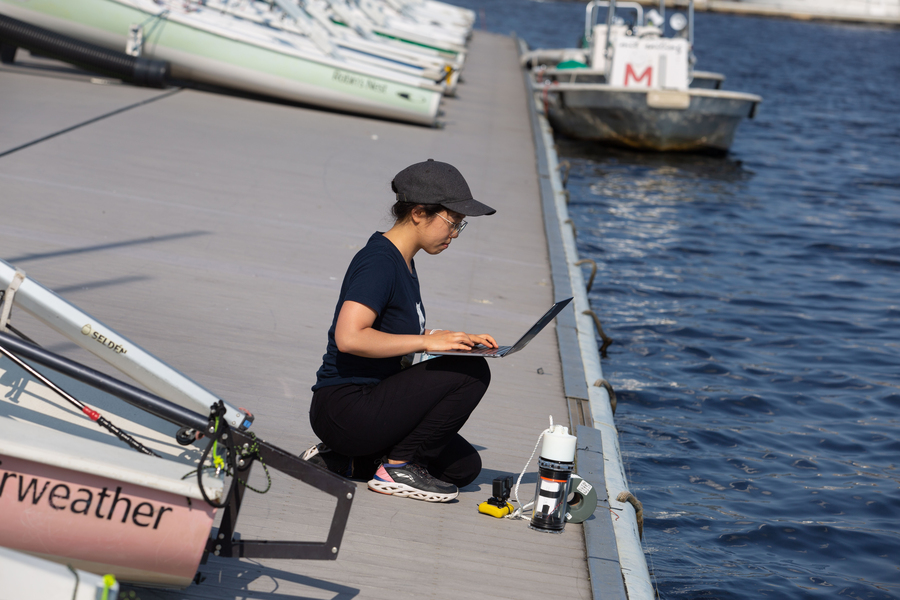IDEAS Alumni: Charlene Xia (G), Sustainable Sea
Charlene Xia (G), IDEAS 2021 grantee, was featured by MIT News for her IDEAS project, Sustainable Sea. Xia proposed a machine learning-based aquaculture monitoring and response system that uses microbiome data to predict and prevent disease in seaweed plants. She decided to focus on seaweed aquaculture because it is not only an excellent source of food, but it also helps combat climate change by removing tonnes of nitrogen and sequestering carbon emissions. Read an excerpt from her interview with MIT News below:

Alongside Wallace and Associate Professor Stefanie Mueller, Xia proposed a project to predict and prevent the spread of diseases in aquaculture. The team focused on seaweed farms in particular.
Already popular in East Asian cuisines, seaweed holds tremendous potential as a sustainable food source for the world’s ever-growing population. In addition to its nutritive value, seaweed combats various environmental threats. It helps fight climate change by absorbing excess carbon dioxide in the atmosphere, and can also absorb fertilizer run-off, keeping coasts cleaner.
As with so much of marine life, seaweed is threatened by the very thing it helps mitigate against: climate change. Climate stressors like warm temperatures or minimal sunlight encourage the growth of harmful bacteria such as ice-ice disease. Within days, entire seaweed farms are decimated by unchecked bacterial growth.
To solve this problem, Xia turned to the microbiota present in these seaweed farms as a predictive indicator of any threat to the seaweed or livestock. “Our project is to develop a low-cost device that can detect and prevent diseases before they affect seaweed or livestock by monitoring the microbiome of the environment,” says Xia.
The team pairs old technology with the latest in computing. Using a submersible digital holographic microscope, they take a 2D image. They then use a machine learning system known as a neural network to convert the 2D image into a representation of the microbiome present in the 3D environment.
“Using a machine learning network, you can take a 2D image and reconstruct it almost in real time to get an idea of what the microbiome looks like in a 3D space,” says Xia.
The software can be run in a small Raspberry Pi that could be attached to the holographic microscope. To figure out how to communicate these data back to the research team, Xia drew upon her master’s degree research.
In that work, under the guidance of Professor Allan Adams and Professor Joseph Paradiso in the Media Lab, Xia focused on developing small underwater communication devices that can relay data about the ocean back to researchers. Rather than the usual $4,000, these devices were designed to cost less than $100, helping lower the cost barrier for those interested in uncovering the many mysteries of our oceans. The communication devices can be used to relay data about the ocean environment from the machine learning algorithms.
By combining these low-cost communication devices along with microscopic images and machine learning, Xia hopes to design a low-cost, real-time monitoring system that can be scaled to cover entire seaweed farms.
“It’s almost like having the ‘internet of things’ underwater,” adds Xia. “I’m developing this whole underwater camera system alongside the wireless communication I developed that can give me the data while I’m sitting on dry land.”
Armed with these data about the microbiome, Xia and her team can detect whether or not a disease is about to strike and jeopardize seaweed or livestock before it is too late.
While Xia still daydreams about opening a restaurant, she hopes the seaweed project will prompt people to rethink how they consider food production in general.
“We should think about farming and food production in terms of the entire ecosystem,” she says. “My meta-goal for this project would be to get people to think about food production in a more holistic and natural way.”
Click here to read the full article on the MIT News website!
Tags: IDEAS, IDEAS 2021, IDEAS Alumni Profiles, PKG Alumni
